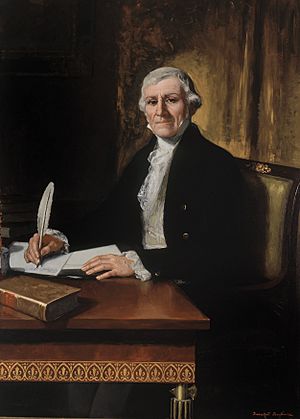Ramón Lázaro de Dou y de Bassols facts for kids
Quick facts for kids
Ramón Lázaro de Dou y de Bassols
|
|
|---|---|
 |
|
| 1st President of the Congress of Deputies | |
| In office 24 September 1810 – 23 October 1810 |
|
| Preceded by | Office established |
| Succeeded by | Luis Rodríguez del Monte |
| Member of the Congress of Deputies | |
| In office 19 September 1810 – 20 September 1813 |
|
| In office 13 September 1813 – 15 January 1814 |
|
| Personal details | |
| Born |
Ramón Lázaro de Dou y de Bassols
February 11, 1742 Barcelona, Spain |
| Died | December 14, 1832 (aged 90) Cervera, Spain |
| Alma mater | University of Barcelona |
| Profession | Chancellor and professor of the University of Cervera |
Ramón Lázaro de Dou y de Bassols (born February 11, 1742 – died December 14, 1832) was an important Spanish professor and priest. He became the very first President of the Congress of Deputies in Spain. This happened after he was chosen by the Cortes of Cádiz, which was like a special parliament. Ramón Lázaro de Dou was a member of this parliament, representing the region of Principality of Catalonia from 1810 to 1814. He was known for his new ideas about how government rules and laws should be organized, which is called administrative law.
Contents
Ramón Lázaro de Dou's Early Life and Studies
Ramón Lázaro de Dou began his education with the Jesuits. He studied law at the University of Cervera. In 1770, he became a professor there, teaching about church laws called Decretals. He also became a priest and wrote several books.
Between 1771 and 1776, he worked as a lawyer. He helped his brother Ignacio, who advised the Consulate of the Sea in Barcelona. This group dealt with trade and taxes.
Developing Spanish Government Law
Ramón Lázaro de Dou wrote an important work called Institutiones del Derecho público general de España. This was published between 1800 and 1803. It was the first time someone clearly explained how the government worked in Spanish-speaking countries.
His work also showed the difference between general rules for government actions and specific rules for certain officials or areas of law. This was a new way of thinking about how laws should be structured.
In 1805, he became the Chancellor of the University of Cervera. This was a very important leadership role, and he kept it until he passed away.
Ramón Lázaro de Dou's Role in Parliament
Ramón Lázaro de Dou was chosen to be a member of parliament, also known as an MP. He represented the Province of Tarragona and the Principality of Catalonia. He joined the first meeting of a Spanish parliament on September 24, 1810.
He was then elected as the first President of the Congress of Deputies. He won with 50 votes. Even though he didn't run for president again, he continued to serve as a substitute MP.
Shaping the Spanish Constitution
Ramón Lázaro de Dou was a reformist, meaning he wanted to make changes, but he was also moderately conservative. He believed in National Sovereignty, which means the power of the country comes from its people. He also signed the important Spanish Constitution of 1812.
He took part in many important discussions. These included talks about ending torture, allowing freedom of the press, and organizing the different provinces. He also discussed changes to the country's money system, called the Treasury. He strongly supported a simple, direct tax system for everyone.
Later Life and Legacy
After King Ferdinand VII canceled the 1812 Constitution, Ramón Lázaro de Dou focused on leading the University of Cervera. He continued his studies on economics. He was very famous during his time.
His fame was so great that when Pope Gregory XVI decided to get rid of the Chancellor position in Spanish universities, he made an exception for the University of Cervera, allowing Ramón Lázaro de Dou to keep his role.
See also
 In Spanish: Ramón Lázaro de Dou y de Bassols para niños
In Spanish: Ramón Lázaro de Dou y de Bassols para niños
 | Tommie Smith |
 | Simone Manuel |
 | Shani Davis |
 | Simone Biles |
 | Alice Coachman |

